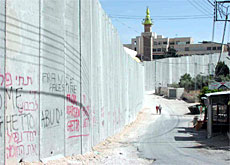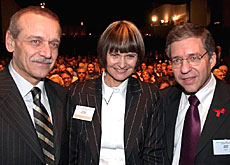The post-Arafat era begins

The Palestinian leader Yasser Arafat is said to be in a critical state “between life and death” in a Paris hospital, and some of his powers have been transferred to his prime minister.
Two Swiss experts comment on his legacy and the prospects for peace in the Middle East.
Swiss experts say Arafat, 75, will be remembered as the leader who led the way to negotiations with Israel and hopes for peace, but who ultimately failed.
Erich Gysling, an authority on the Middle East, says that although Arafat lost some support among his people in latter years, he was still respected as the man who came closest to fulfilling the dream of an independent Palestinian state.
Gysling’s view is shared by Daniel Vischer, a Swiss parliamentarian who visited the West Bank in September.
“Arafat played a major role in getting the Palestinians to where they are now. Any success the Palestinians have had is mainly thanks to him,” Vischer told swissinfo.
Outside view
But outside the Palestinian territories Arafat’s legacy will be a mixed one, says Gysling.
As military leader of the Palestinian Liberation Organisation (PLO), Arafat was associated with violence and hijackings in the late 1960s and 70s.
But in later years he took on the role of statesman and mediator among the various Palestinian groups, and shared the Nobel peace prize in 1994 with Israeli Prime Minister Yitzhak Rabin and Foreign Minister Shimon Peres.
Interviewed by Swiss Radio International earlier that same year, Arafat praised Switzerland’s help to the Palestinian people and hinted at an end to the conflict.
“We don’t fight just for the sake of fighting, we fight to achieve our aims, for the future and interests of our people. Is there any revolution which lasts for ever?”
Dashed hopes
In the early 1990s, the Oslo peace process fuelled hopes for a lasting settlement with Israel, and progress was made with the foundation of the Palestinian Authority and the handover to Palestinian control of parts of the occupied territories.
But the process collapsed when the two sides failed to agree on a resolution at the Camp David talks in 2000, and Arafat saw his international support eroded.
In the past three years, the Palestinian leader has become increasingly isolated, prevented by Israel from leaving his bombed-out headquarters in the West Bank town of Ramallah.
“Among the Palestinians he certainly will be remembered as the person who led the way to negotiations with Israel and hopes for peace,” Gysling told swissinfo.
“He almost brought about independence, but at the final stage he failed – this probably will be the sentiment of the majority.
“But the Israeli view that he was the main sponsor of terrorism does not correspond to reality.”
Gysling said it wasn’t clear if Arafat could have achieved a peace accord by making more compromises at Camp David. Both Israel and the US blame him for rejecting a generous offer.
“There are commentators who say the Israelis were not ready to make any sort of a compromise regarding Jerusalem and the right of return of Palestinian refugees,” he told swissinfo.
Peace prospects
Analysts are sceptical about the current prospects for peace in the region. For the Palestinians, a key issue is the right of displaced persons to return to their homes in Israeli-occupied areas.
Daniel Vischer says they are likely to insist on this right in any future negotiations with Israel. This insistence, he says, is also a stumbling block to Palestinian acceptance of the Swiss-backed peace plan, the Geneva Accord.
The initiative, which envisages the division of Jerusalem and creation of a Palestinian state, has not been officially endorsed by the Palestinian leadership since its launch last December.
“The Palestinians generally welcome the accord, but it’s clear that there is disagreement on one important point – the right of return of all refugees. That is something the Palestinians insist upon, and I think it will be one of the key points in future negotiations.”
Violence and poverty
A prerequisite for peace from the Israeli side is that the Palestinians clamp down on the militant groups that have carried out frequent suicide bombings and attacks in Israel.
Gysling says Arafat could be accused of not doing enough to tackle the rampant poverty in the Gaza Strip. This, he says, is one of the main reasons for the resurgence of militant Islamic groups, and will pose a huge challenge to Arafat’s successor.
“Forty to 60 per cent of Palestinians are living below the poverty line, with most surviving on just over one dollar a day,” said Gysling, adding that the standard of living was comparable with that in Cameroon or Haiti.
“If things do not change drastically, Islamic fundamentalists will win against anyone who may be chosen as successor to Arafat,” he warned.
swissinfo, Morven McLean
Yasser Arafat was born Muhammad Abd al-Rahman ar-Rauf al-Qudwah al-Husayni, also known as Abu Ammar, on August 24, 1929.
He has been the leader of the Palestinian Authority since 1993 and its president since 1996.
He has also been chairman of the Palestine Liberation Organization since 1969 and leader of Fatah, the largest of the factions within the PLO.
In 1994, he was co-winner of the 1994 Nobel Peace Prize with Israeli Prime Minister Yitzhak Rabin and Foreign Minister Shimon Peres.

In compliance with the JTI standards
More: SWI swissinfo.ch certified by the Journalism Trust Initiative














You can find an overview of ongoing debates with our journalists here . Please join us!
If you want to start a conversation about a topic raised in this article or want to report factual errors, email us at english@swissinfo.ch.